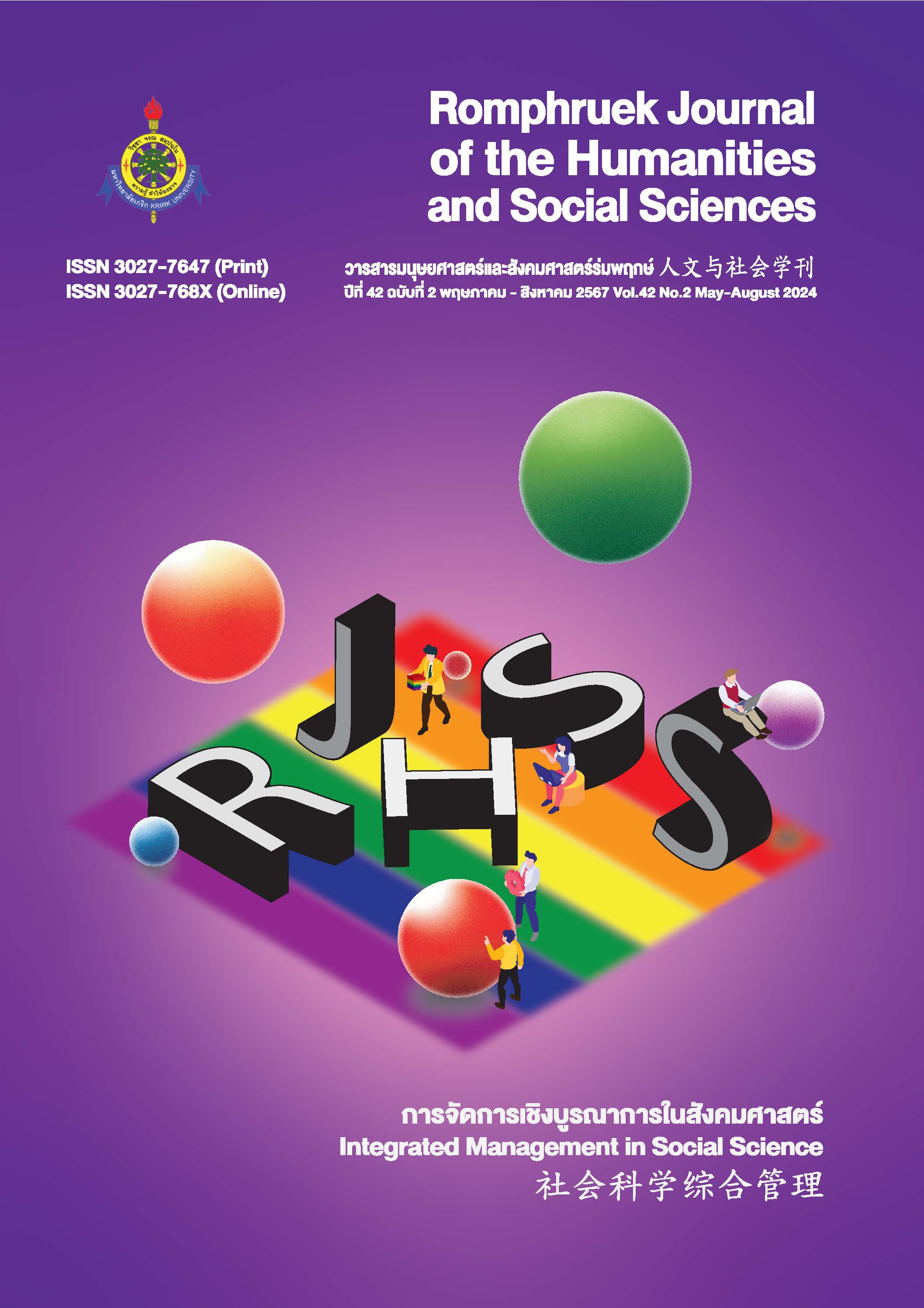Tax Challenges of E-Commerce in the Marketing 6.0 Era
Main Article Content
Abstract
In today's world, concepts such as big data, social media, corporate social responsibility, and e-commerce have become part of consumers’ lives, thus the shift to Marketing 6.0 is happening faster than ever before One of the most important activities affecting consumer purchasing decisions is e - commerce, which affects business revenue and expenses that generate business income. E-commerce has therefore become an increasingly important issue in the process of various business transactions. Included are the accounting and tax matters that businesses have an obligation to do correctly. In this study, a literature review was conducted to show the change in business model from traditional to e-commerce business. Potential issues arose in the tax treatment of e-commerce businesses. As a result, e-commerce businesses had to adapt to these changes, and follow the rules and regulations of accounting and taxes correctly, including income tax, and value-added tax.
Article Details

This work is licensed under a Creative Commons Attribution-NonCommercial-NoDerivatives 4.0 International License.
Every article published in the Romphruek Journal of the Humanities and Social Sciences is the opinion and point of view of the authors. Thery're not the viewpoint of Krirk University or the editored department. Any part or all of the articles for pablication must be clearly cited.
References
Akkaya, B. (2020). Review of leadership styles in perspective of dynamic capabilities: An empirical research on managers in manufacturing firms. Yönetim Bilimleri Dergisi, 18(36), 389–407.
Akkaya, B., & Tabak, A. (2017). Theimpact of dynamic capabilities on firm perceived marketing performance of small and medium sized enterprises. Transnational Marketing Journal, 5(2), 121–125.
Akkaya, B., & Tabak, A. (2020). The link between organizational agility and leadership: A research in science parks. Academy of Strategic Management Journal, 19(1), 1–17.
Akyazi, A. (2018). Dijitalleşen ticaret: Yaşlı dostu e-ticaret siteleri üzerine bir araştırma. The Turkish Online Journal of Design Art and Communication, 8(4), 602–614.
Banthita, P., & Kobboon, V. (2021). Thailand's e-Commerce Capability towardsChina's “One Belt One Road” Policy. Journal of Sinology, 15(2), 117-159.
Chodchaungnirun, B. (2020). An Analysis of a Tax Structure Appropriate for the Economic Development of Thailand. Ph.D. in Social Sciences Journal, 10(1), 105-117.
Erragcha, N., & Romdhane, V. (2014). New faces of marketing in the era of the web: From Marketing 1.0 to Marketing 3.0. Journal of Research in Marketing, 2(2), 137–142.
Fucui, M., & Dumitrescu, L. (2018). From Marketing 1.0 to Marketing 4.0 – The evolution of the marketing concept in the context of the 21st century. International Conference Knowledge-Based Organization, 24(2), 43–48.
Germir, H. N. (2015). E-ticaret ve Türkiye’nin 2023 vizyonu. Uluslararası Hakemli Pazarlama ve Pazar Araştırmaları Dergisi, Yaz Dönemi, 5(2015), 42–71.
Hathairat, K., Wiranya, S., Prapaipit, L., & Woranuch, K. (2022) Taxation in the Digital Economy, Journal of Legal Entity Management and Local Innovation, 8(9), 373-388.
Jaensirisak, S., & Tassawa, C. (2017). TAXATION OF SALES PROMOTION. Panyapiwat Journal, 9(1), 242-253.
Jara, A. J., Parra, M. C., & Skarmeta, A. F. (2012). Marketing 4.0: A new value addedtothe marketing throughthe ınternet of things. 2012 Sixth International Conference on Innovative Mobile and Internet Services in Ubiquitous Computing. Sanpaolo Palace Hotel, Palermo, Italy, 852–857.
Kotler, P. (2011). Reinventing marketing to manage the environmental imperative. Journal of Marketing, 75(4), 132–135.
Kotler, P., Kartajaya, H., Setiawan, I. (2021). Marketing 5.0 Technology for Humanity. John Wiley & Sons.
Kotler, P., Kartajaya, H., & Setiawan, I. (2023). Marketing 6.0: The Future Is Immersive. John Wiley & Sons.
Prempanichnukul, V., & Sangboon, K. (2023). Effects of Tax Planning for Sales Promotion on Tax Performance Efficiency of VAT Registrants. Kasetsart Applied Business Journal, 17(26), 54-71.
Rahayu, A. U., Herawaty, I., Rahmawati, N., Prafitriyani, A. S., & Afini, A. P. (2018). Marketing 4.0: A digital transformation in pharmaceutical ındustry to reach customer brand experience. Journal Universitas Padjadjaran, 16(1), 80–85.
Sanpatchaya, S. (2021). Problems and Implications from the Creation of Non-Genuine Transactions in Taxation. Chulalongkorn Law Journal, 39(3), 239-263.
Sawatrum, P., Srisawat, W., Sirisuntarin, P., Kuhapirum, W., & Butcham, S. (2021). Questions and Answers for Taxation on Social Networks: Facebook Thailand. Journal of Accountancy and Management, Mahasarakham University, 13(2), 42-59.
Tanapornpan, R. (1984). Taxation in Thai economic history. Thammasat University Press
Tarabasz, A. (2013). The revaluation of communication in customer approach-towards Marketing 4.0. International Journal of Contemporary Managament, 12(4), 124–134.
Taş, B., & Şeker, Ş. E. (2017). Nöropazarlama ve yönetim bilişim sistemleri. YBS Ansiklopedi, 4(2), 12–17.
The Revenue Department. (2024). Tax Manual for E-Commerce. https://www.rd.go.th/26228.html.
Vassileva, B. (2017). Marketing 4.0: How technologies transform marketing organization. Obuda University E-Bulletin, 7(1), 47–56.


